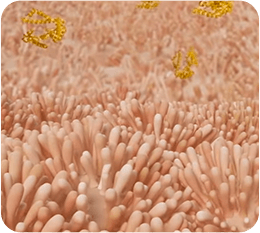
Dutch Parenting Tips on How to Raise a Happier Child
Dutch children have been ranked highly in studies of wellbeing, earnin.... read more


Indigestion (also known as dyspepsia) in children is a discomfort in the upper belly that often occurs after eating.1 It can appear with symptoms like bloating, burning, burping, and nausea.1 Fortunately, indigestion is a common issue that affects children of all ages, similar to adults, and it typically is not a cause for major concern.
In some cases, heartburn, also known as gastroesophageal reflux (GERD), can sometimes occur alongside indigestion.2 This happens when stomach acid splashes back up into the gullet (oesophagus) causing a sour or bitter taste in the mouth or an uncomfortable feeling in the chest, nausea, upper abdominal pain, or even vomiting.
Recognising the signs and causes behind a child's indigestion is important. By understanding what triggers their discomfort, you can take steps to improve their comfort and wellbeing. This might involve making simple dietary changes or addressing underlying issues like eating too quickly or certain food sensitivities.
While indigestion in children can be uncomfortable, the good news is there are often telltale signs to watch for to prevent them from worsening. Especially for young children who may not be able to verbalise their discomfort, it's crucial for parents to watch for these signs of indigestion2,3,4,5:
It's important to remember that occasional indigestion is normal. However, if your child's symptoms are severe, persistent, or accompanied by things like vomiting blood, weight loss, or intense stomach pain, it's important to consult a doctor to rule out any underlying issues.
While dietary factors are common culprits, indigestion in children can also stem from digestive issues, medication side effects, and even anxiety. Here's a closer look at the potential causes:
While indigestion can be challenging to deal with, especially with younger children who don’t know how to vocalise their discomfort, there are ways to ease your child's discomfort at home. Here are some tips for mild cases:
If your child's indigestion is severe, persistent, or accompanied by other symptoms like vomiting blood or weight loss, consult a doctor to rule out any underlying issues.
Indigestion might be a common issue, but there are ways to help your child avoid discomfort! Here are some preventative measures you can take:
Improving your child's digestive system will help in the long run. Check out this article for more ideas on how to improve your child's digestive system naturally!
Tiny tummies are extremely gentle and sensitive. Indigestion happens when they are not able to break down the nutrients that they ingest, thus giving them pain or discomfort. That is why your child’s tummy requires nutrients that are close to its natural structure for easy digestion.
Overheating during milk processing damages the natural structure of milk protein, which can lead to indigestion. That is why Friso® Gold’s LocNutri® Technology uses mild heat treatment during production to preserve the nutrient close to its natural structure, so it is easy to digest. Now upgraded with 2’-FL to support your child’s natural body defence by encouraging the growth of good bacteria in the digestive tract.

Natural nutrient
Milk protein in its natural structure is easy for a child’s still-developing digestive tract to digest

Damaged nutrient
Milk protein that has been damaged is not easy for a child’s still-developing digestive tract to digest
Try Friso® Gold Step 3 and Friso® Gold Step 4. Made with milk and processed only once with LocNutri™ Technology to preserve more than 90% of nutrients, Friso® Gold combines the magical goodness of nature with science to bring you easy to digest milk with more than 50 essential nutrients to help your child grow stronger from the inside.
Friso® Gold contains NOVAS™ Signature Milk, that has naturally small molecules and a soft structure, and is free from added flavours for easy digestion. Additionally, it now contains 2’-FL to support your child’s natural body defences. Curious to know the basics of formula milk ingredients?
DHA, AA, Omega 3 & 6 - To fuel learning growth. DHA is important for optimal visual and cognitive development10. AA is recognised for its key role for optimal health, cognition and development during foetal and early postnatal life11. Omega 3 and 6 fatty acids are important for normal development of the brain, nervous system, sensory organs and intelligence12.
Calcium, Protein, Vitamin & Minerals - Muscle and bone growth. Calcium helps in the normal growth and development of bones and teeth. Protein is essential for your child’s growth, maintenance and repair for the body13. Vitamins and minerals are vital for growth and metabolism14.
2'-FL, GOS, Nucleotides & Bifido Lactis - Helps absorb key nutrients & build strong immune systems. GOS are prebiotics that can help with constipation and more15. Nucleotides can promote healthy gastrointestinal and immunological growth in young children16. Bifido Lactis is important for diarrhoea prevention as well as immune and gut maturation17. 2'-FL, also known as 2′-fucosyllactose, acts as a prebiotic, selectively nourishing the beneficial bacteria in a child's developing gut microbiome.18,19 This targeted nourishment is essential for supporting the proper maturation of a child's immune system and digestive system during their early years.20,21,22,23
Curious to know the basics of formula milk ingredients? Check out our guide on what to look for in formulated milk powder for children, the various ingredients, what to avoid and key considerations to keep in mind when choosing formula milk for your child right here!
Ensuring your child has good digestion is crucial not just for their immediate comfort but to also prepare them for a healthier, happier future. Keen on trying it out? You may request a sample: Try a free 1-day trial pack or 50% off for 6 days-trial pack.
References